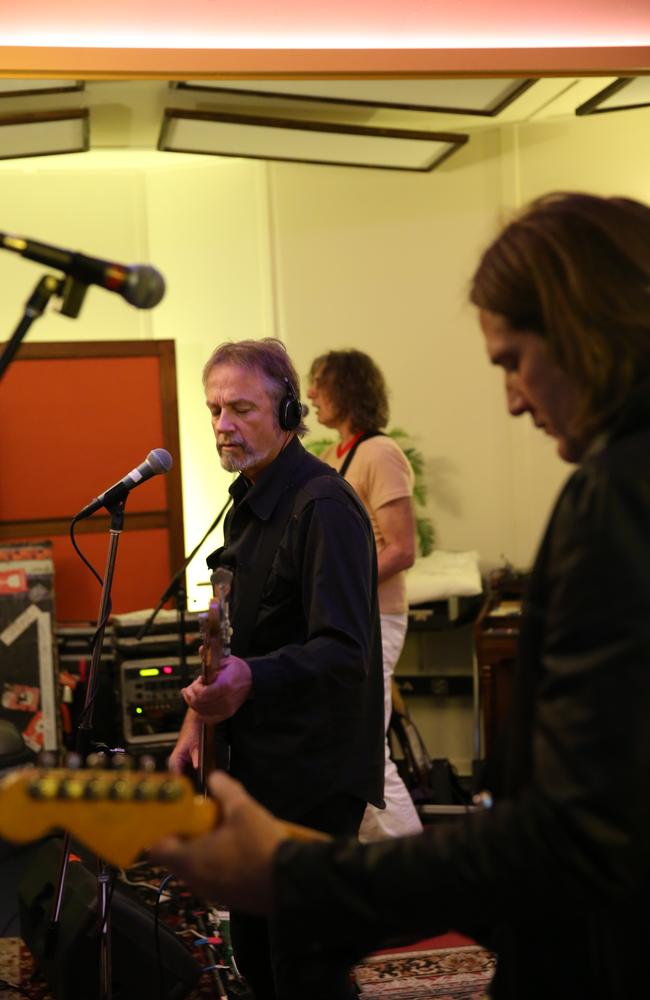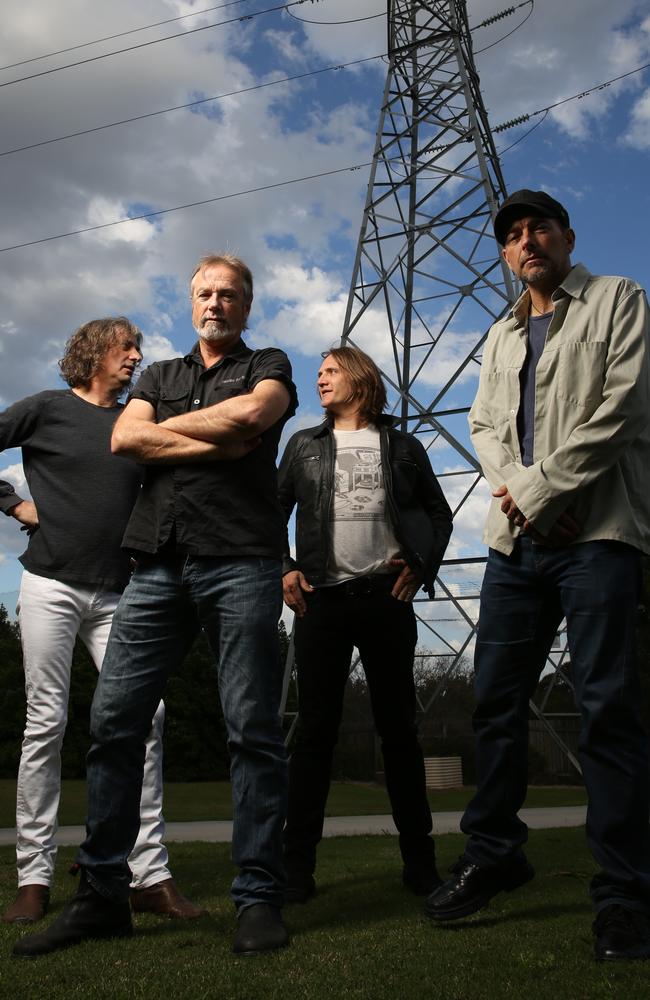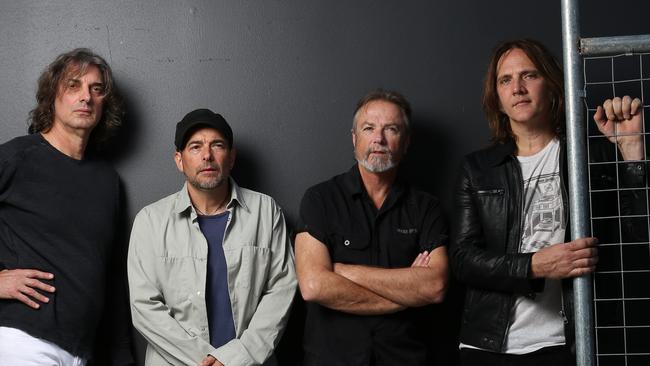STEVE Kilbey had a problem. He solved it the way he often approaches life, with pure instinct. It took less than a minute.
It had been four years since the last Church album, the longest gap between new releases in a career that stretched back to the band’s 1980 debut, Of Skins and Heart. And guitarist Marty Willson-Piper, arguably the member of the band most popular with the Church faithful, had returned to Sweden and wasn’t responding to Kilbey’s attempts to contact him.
Turmoil is nothing new to The Church and the quartet always reasoned that friction was an essential part of what kept them moving forward, kept them reinventing their music and kept them relevant. To many fans, Willson-Piper was as crucial to the band as Kilbey and its other founding member, guitarist Pete Koppes. Even Koppes, who first played with Kilbey in a glam band called Precious Little in Canberra in 1973, had bailed out of The Church on occasion, but Willson-Piper had been there on every Church recording, persevering through management troubles, Kilbey’s heroin period in the ’90s, and celebrating the triumphs too.
Yet in 2014 The Church still stands, albeit minus one of its foundation pillars, Willson-Piper. And Kilbey, taking a break from rehearsing the new band lineup in Brisbane, fit, trim and looking much younger than his 60 years, is bubbling with excitement — not about the band’s considerable past, but its future. He explains: “Marty wasn’t kicked out or asked to leave. He went to Sweden and when I started writing to him to say let’s make a new album, he didn’t even write back. I tried to contact him by every known means and he didn’t reply, so we say he is ‘unavailable’.”
Kilbey found himself discussing a replacement for Willson-Piper with Tim Powles, a New Zealander who joined The Church 20 years ago and, as drummer, producer and grounding force, has played an integral role in the band’s survival. “When we realised Marty wasn’t going to get back to us I said to Tim, we have to find someone with stature,” Kilbey recalls. “He has to have his own trip, he can’t be some weedy little guy coming in to play guitar. It has to be somebody with experience and gravitas.”
Easier said than done. Until a friend of Kilbey’s suggested ex-Powderfinger guitarist Ian Haug, a massive fan of The Church since his teenage years: “As soon as she said that, I was on the phone to him.”
Haug confirms the story. “I had just been to the funeral of Brisbane roadie Steph Popoff (the former production manager for the John Butler Trio died last year). It was between the service and the wake and I was driving by myself, trying to process it all, feeling very sad. The phone rang and it was Kilbey. He didn’t even say hello. He said, ‘If I asked you to join The Church, what would you say?’ I said, ‘I would probably say yes.’ He said, ‘OK, see ya.’ I was left stuck in traffic going, ‘What the f. k was that?’
“I never would have visualised joining The Church; it was the last thing I would have thought was a possibility, but as soon as it did become a possibility it just really seemed to work.”
Haug, 44, a founding member of Powderfinger, had fought hard to prevent the band breaking up. The day before they played their last show in hometown Brisbane in October 2010, he told me: “I want to make music until the day I die. I don’t necessarily expect it to be at the level that the Fingers have achieved.”
Any working musician knows that to be part of a high-profile band is rather like capturing lightning in a bottle. Very few people manage it twice. “I tried to be a peacebroker in Powderfinger for a long time,” Haug says of the fraying relationships that led to the band’s demise. “I can’t believe it’s been four years since our last show. It feels good to let it go.”
Kilbey and Koppes met Haug at his Airlock recording studio, in Brisbane’s northwest, last September to see if sparks could fly. Haug and Koppes both sensed that Kilbey’s hunch was right. That day they wrote a song called Miami, now an eight-minute epic on the new studio album, Further/Deeper, the band’s 21st. The Church’s work method is different from that of most bands, and has been since 1986, when the band started sharing songwriting credits rather than denoting Kilbey as the main writer. No one brings prepared songs to the table. They get together with their instruments and a blank slate and see what happens, recording as they go. Kilbey then adds lyrics and melodies to those improvised pieces.
In November 2013, when it was officially announced that Haug was joining The Church, there was a divided social media response. Some longtime fans wondered how Haug, from a mainstream rock ’n’ roll band, would gel with the more atmospheric explorations of their heroes. The subtext was: Powderfinger were popular and it’s hard to be cool when you’re popular. The Church define cool. How will that work?
Unfazed, Haug loaded guitars and amps into his car and headed to Sydney to record with his new band. Everyone was ready for the next phase. In five days, they wrote more than 20 songs. Suddenly, they had an album. “Ian’s enthusiasm re-energised the rest of us,” Kilbey says. “I’m not blaming Marty for this, but a certain cynicism and scepticism was shattered when Ian joined the band. Before I might have gone, ‘Oh, no.’ Now I would go, ‘Let’s try it’. Everyone joined in that newfound exploration.
“Ian’s all over this record; he’s the prime mover behind a lot of the songs. He was always there with his guitar strapped on, (suggesting) ‘What about this?’, overdub after overdub. It’s very inspiring to be part of that.”
As all longtime fans of the band know, every Church album is different, yet every Church album also sounds just like The Church. It’s something they’ve had right from the start, an original sound that comes not just through Kilbey’s voice but from the combination of his poetic lyrics, the use of chiming, open strings on electric guitars, and an element of mystery and ambiguity that no-one can quite put a finger on.
The Church are not a singles band. Even their best-known early songs, Unguarded Moment and Almost With You, weren’t major hits. But there is something in their music that rewards listeners, keeps them playing the albums and discovering something fresh in them years after the event.
Haug’s view as the new boy is instructive. “It’s strange,” he says. “None of it is like, ‘Let’s do the Church thing here.’ It just happens. They might even say, you shouldn’t do that, it’s too ‘old’ Church. I would say, don’t be scared of it; that’s why people like you.”
For his part, Haug was prepared for a divided response from fans. Playing in a huge band like Powderfinger also gave him a thick skin, since the more successful you are, the more haters you attract. “I’m not trying to be Marty — he was one of my favourite guitarists when I was growing up, and I certainly don’t want to replicate everything he did,” Haug says.
Is the band’s image as moody and inscrutable outsiders dispelled once inside the tent, I wonder? “It is fairly accurate,” Haug says. “They are all so into what they do, they are artists, and they are all quite eccentric in their own way. But we get along really well. They have a lot of history and if they start talking about stuff, the heavy times from the past, I go and make myself a cup of tea. It’s not my place to take sides on anything.”

AH YES, THOSE HEAVY TIMES. FOR SOMEONE who is usually pinned as enigmatic in any old press clipping on the band, Peter Koppes is always a forthright and articulate interview subject. On the morning we meet, he is first to arrive at rehearsal. His excitement at what he is hearing is palpable. “It is blowing us away,” Koppes says, straight off. So much for inscrutable. These days, Koppes lives on the Sunshine Coast. He learned so much about the pitfalls of the music business as a member of The Church that he now teaches the subject at Nambour TAFE. Koppes, 58, and Kilbey have played music together for most of the past 40 years, since they were 19 and 20, respectively. Kilbey tells me Koppes is the best musician in the band. He is a natural at anything he picks up, from drums to bass and keyboards, and the detail of his work on guitars is a vital ingredient in The Church.
He has also left the band a few times. The first was after The Blurred Crusade album in 1982. Later, he and Willson-Piper threatened to leave if the band didn’t start co-writing songs instead of Kilbey taking most of the credits. Koppes left before the Sometime Anywhere album was recorded in 1994, but soon returned. He mentions that he has always been the band’s “watchdog” in business matters. Sometimes he would come home from a US tour and have to sign on for the dole to support his young family. That tends to focus the mind. For a time Tim Powles managed the band, then handed over responsibility to Willson-Piper. While the latter maintains his silence, it’s clear that the stress of managing The Church while also being a member of the band led to the fracture.
THE CHURCH’S MUSIC HAS ALWAYS HAD A psychedelic element, and Kilbey has long been open about his drug use. He has been a regular marijuana user for decades but in the early ’90s started using heroin. His descent into addiction is detailed in Brisbane writer Andrew McMillen’s recent book, Talking Smack. He says he stopped using the drug in 2002. According to Koppes, “The reason a lot of artists take heroin is it helps them contain their nervousness and excitement at being in this business. I don’t want to recommend it to anyone because it’s like alcohol, [in the sense that] most people misuse drugs.”
Of his own tumultuous experiences with the band, he says: “Most people, if they don’t have friction, they don’t learn a lot. There was always friction in the band and I always thought of it as a learning experience. Being rewarded with such an amazing new band and the chemistry we have now, I feel vindicated for being as tolerant as I could be under the circumstances of that friction you get from artistically passionate people.”
At rehearsal, I sit and watch as the band starts working their way into a song called Laurel Canyon, from the new album. You start to get a sense of how The Church works. Koppes and Haug with their arsenals of effects pedals, never looking at each other but listening intently; Powles at the back on his kit, keeping watch. As a drummer he is absolutely rock solid but he’s also part musical director, part ship’s captain. He keeps The Church on course, fair wind or foul.

“All those years when Steve was struggling personally, I became the central point in holding things together,” Powles says. “When we started getting record deals again, it was me going to the outside world saying, ‘Steve says no’. I could see we were gaining strength by not doing the things that were expected of us by the industry. Now Steve is relaxed, he’s made peace with the past and knows what it means to him, and we are loving the art, we can say yes.”
Powles, 54, is certain that 2011’s Future Past Perfect tour was a turning point. “That’s the best received tour we’ve done in America by a mile. We were blown away by the response, people saying, ‘That show was in my top ten’. Then we lost Marty, so we were in a spot where we not only had to top what we did as a live band but make a better record than Untitled [the last album].
“We don’t want to be one of those bands that just fizzles out. We know rock ’n’ roll’s not supposed to do this. Steve’s heading into his 60s. I know there are a few bands still doing it but they are relying heavily on their back catalogue. We are, possibly stupidly, obsessed with what we are doing now. With Ian coming into the band, we had to make something that we loved so much that it went beyond any expectations of what it was before.”
THE CHURCH MIGHT NOT THROW COMPLIMENTS around, but I give Kilbey one. I tell him he looks well. “I haven’t smoked a lot of cigarettes, I don’t drink a lot of booze, I don’t eat meat, and for the past 15 years, no matter what happens, I’m down at the pool doing my laps, and then an hour of yoga,” he says. “I don’t think hard drugs are the worst thing you can do, although they can kill you very quickly. But a life of booze and eating meat ...”
The songs keep flowing. At last count, Kilbey has 750 original songs registered with Australian copyright agency APRA, which certainly puts him near the head of the class for productivity among Australian songwriters. “I’m not saying quantity is quality,” he says.
“Just because I’ve written that many songs doesn’t mean anything. But imagine if you were having an operation on your brain and a 60-year-old surgeon walked into the theatre. You would think, I’m in safe hands. He’s been doing this all his life and he’s very good at it.
“I think I have become very good at pulling lyrics and melodies out of the air. Melodies weren’t always my strong point; on a lot of The Church’s early records the melodies weren’t as elaborate as what I’m doing now. In the last few years, I think I am tapping into something. We write a piece of music, I go outside for ten minutes and the words and melodies just come out of nowhere. It’s like I’m tapping into the collective human subconscious.”
He clicks his fingers. Just like that.
Further Deeper (MGM Distribution) is released Oct 17. The Church play the album
at the Old Museum, Brisbane, Nov 1 (tickets on sale at oldmuseum.org from Oct 17)


Add your comment to this story
To join the conversation, please log in. Don't have an account? Register
Join the conversation, you are commenting as Logout
Here’s what you can expect with tomorrow’s Parramatta weather
As winter sets in what can locals expect tomorrow? We have the latest word from the Weather Bureau.
Here’s what you can expect with tomorrow’s Parramatta weather
As winter sets in what can locals expect tomorrow? We have the latest word from the Weather Bureau.